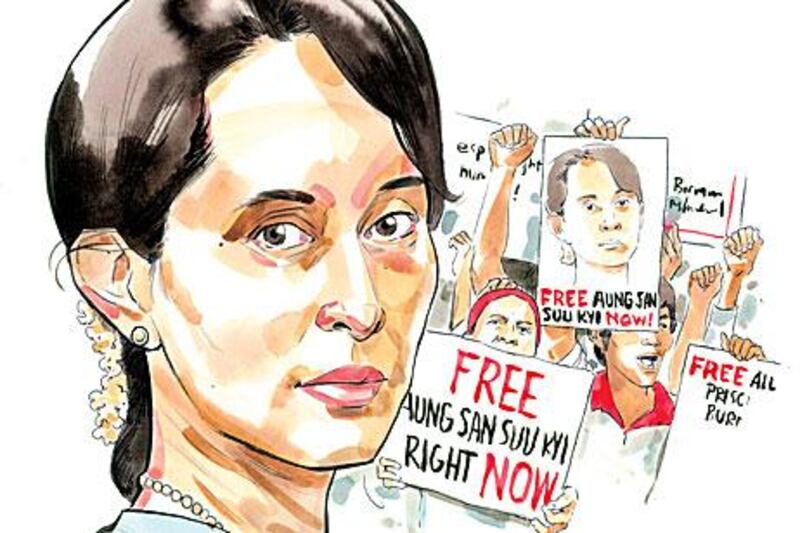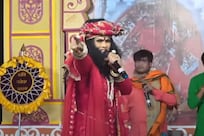By the time Aung San Suu Kyi gave her most famous speech to the people of Myanmar in 1990, the tragedy of her country, still known by many as Burma, and the trajectory of its politics was clear.
Demonstrations had choked the streets of Myanmar in the years previously, as thousands of ordinary people rose up demanding security and democracy, only to be brutally shot down.
Nor was there any doubt how the ruling junta viewed her. The year before, soldiers had trained their guns on her as she gave a speech, waiting for the order to fire.
But Suu Kyi was calm when she rose to speak in 1990.
"It is not power that corrupts but fear. Fear of losing power corrupts those who wield it and fear of the scourge of power corrupts those who are subject to it," she began. "The people of Burma had wearied of a precarious state of passive apprehension where they were 'as water in the cupped hands' of the powers that be."
She evoked her father and Mohandas Gandhi. "The essence of his teaching was fearlessness and truth, and action allied to these." In the years since, Suu Kyi herself would demonstrate such qualities.
Suu Kyi's early life was dominated by her father's career and its aftermath. Gen Aung San (after whom Suu Kyi is named) was a leader of the Burmese resistance to British colonial rule. He founded the Burmese army and, after the Second World War, became de facto prime minister under British rule, leading Burma towards independence. He was assassinated in 1947, six months before independence, when his youngest daughter, Suu Kyi, was just two.
Suu Kyi grew up with a clear idea of her family's place in Burmese politics - her mother was later ambassador to India - but for a long time she seemed unlikely to follow. After studies at Oxford University, she married Michael Aris, an academic and Tibetan scholar and for much of the 1970s and 1980s, Suu Kyi lived a quiet existence as a mother and wife, first in Bhutan, where her husband was tutor to the royal children, and later England, when Aris returned to become a lecturer.
In a family photograph taken in 1974 on a visit to Burma after the birth of her first child, Suu Kyi and her husband stare intensely at the camera. At 29, Suu Kyi looks breathtakingly young and fragile, a new mother with her whole life ahead of her. The world of Burmese politics, a decade into its ill-fated experiment with socialism, seems very far away.
All of that changed in 1988, after her mother suffered a stroke. Suu Kyi returned to an impoverished Rangoon, the former capital, now known as Yangon, that was turning decisively against one-party rule. There had been sporadic outbursts of dissent since the start of military rule, but in 1988, a series of protests and demonstrations began that resembled an uprising. Thousands took to the streets against the regime of Ne Win, the general who had seized power in the 1962 coup, facing the bullets of the Burmese army. As the protests entered the summer, Ne Win resigned, warning protesters that if there was more unrest, there would be more casualties. "When the army shoots, it shoots to kill," he said.
With Ne Win gone, the protests intensified. Pro-democracy activists sensed this was their best chance to change the system and ordinary Burmese poured into the streets. Newspapers were published and rallies were held. A general strike was called. During the whole second week of August 1988, the capital was besieged with people.
But the army fired back and kept firing. In an attempt to impose order, soldiers fired directly at protesters, killing thousands.
The demonstrations and killings had a profound effect on Suu Kyi, still nursing her mother, and she decided she could no longer remain silent. At the end of August, she addressed a crowd of hundreds of thousands in front of the Shwedagon Pagoda, the capital's most famous landmark. The woman whom Burmese would later revere simply as "the Lady" had entered national politics.
With her elegant looks, political heritage and calm exposition of non-violence, she quickly found wide support. With her fluent English, Suu Kyi garnered support beyond Myanmar's borders. But not enough - with no external assistance from its neighbours or the West forthcoming, the movement could not defeat the generals, and the following month the military retook control of the country. Martial law was imposed and thousands of activists locked up.
Allying herself with the pro-democracy movement, Suu Kyi formed a political party, the National League for Democracy. When the junta called an election for 1990, the league swept the ballot, taking 392 of the 492 contested seats. But the junta refused to hand over power and Suu Kyi was placed under house arrest.
Since then, she has been the face of Myanmar's plight, a symbol of resistance over long years when it often seemed the world had forgotten the Myanmarese.
Her defiance, her simple request that the ballot should rule, has taken a considerable personal toll. She has spent 15 of the past 21 years under house arrest. Her husband was diagnosed with prostate cancer in 1997, when Suu Kyi had been released from house arrest. The junta refused Aris a visa to enter Myanmar and Suu Kyi refused to leave, fearing the generals would not allow her to return. Aris died in 1999, having not met his wife for four years.
Having given so much for the cause, her release last weekend attracted massive international attention. For the Myanmarese, hearing her voice was hugely uplifting. Barely had the roadblock and barbed wire that sequestered her house in Yangon been lifted when the crowd surged forward to glimpse their hero. They came in their thousands to hear her speak a few words, to remind her they had waited for her.
In interviews after her release, Suu Kyi looked relaxed, happy but determined. She reached out to the military. "I would like them to be the people who have decided that our country has a right to certain standards of freedom, of security," she told the BBC. "I want them to be the heroes."
Yet there is a curious ambiguity about Suu Kyi's future. The Lady herself has not changed: the simplicity and the steel remain. Nor have the feelings of many ordinary Myanmarese changed: the crowds celebrating and the cars beeping horns would have left the generals in no doubt.
But perhaps the political situation has changed. Than Shwe, the general who sits atop the military junta that grips the country, has transformed himself into a simulacrum of a democrat by allowing recent multiparty elections. Whether he will resign and allow the victors to take power is unclear, with the United Nations yesterday condemning the election as "unfair".
What role will the generals allow for the Lady in this configuration? An easing of relations, a meeting - as Suu Kyi has requested - or a swift return to house arrest for Suu Kyi once the eyes of the world move on?
Only the generals know. But Suu Kyi's mind is made up; she has made clear she intends to keep working for democracy. It is the only path she knows. "Saints, it has been said, are the sinners who go on trying," she stated in her 1990 speech. "So free men are the oppressed who go on trying and who in the process make themselves fit to bear the responsibilities and to uphold the disciplines which will maintain a free society." Whatever happens in the world around her, it is certain the Lady will keep trying.
* The National







